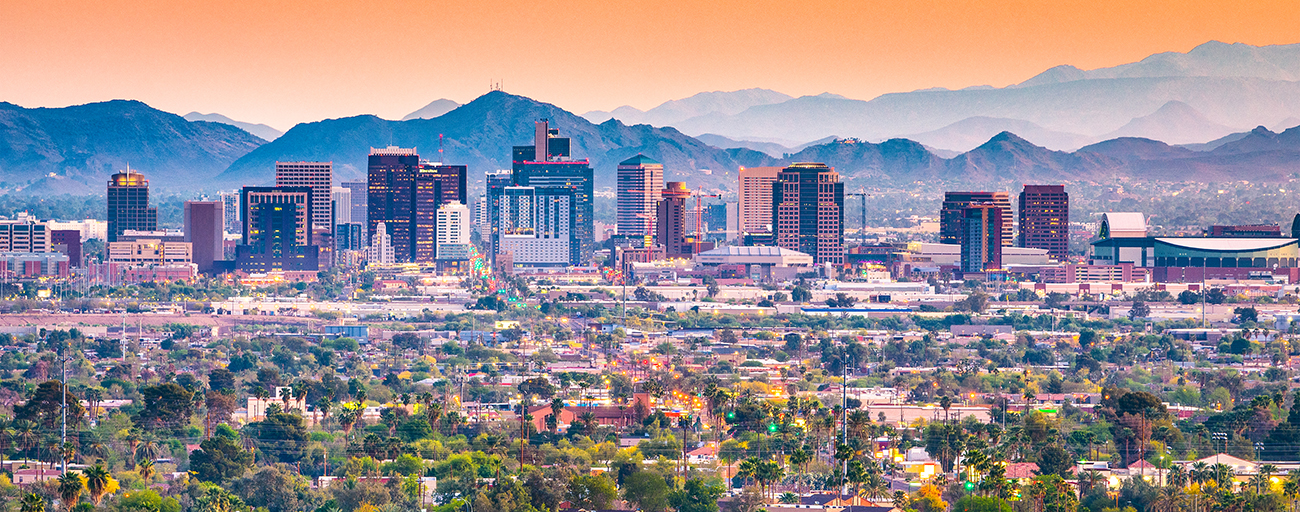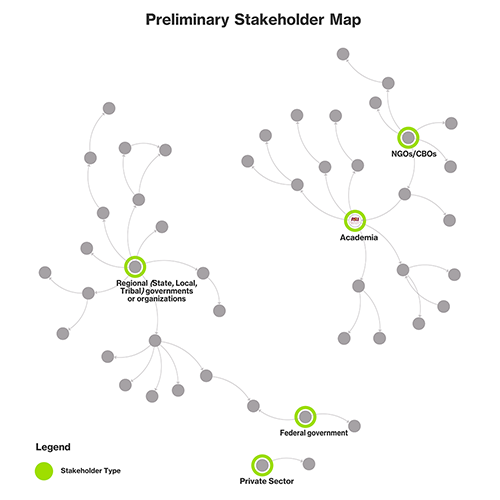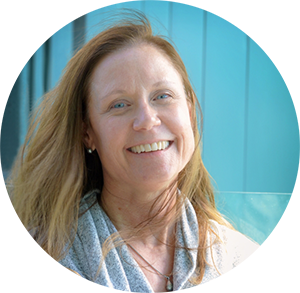
Building collaborative capacity for regional resilience projects
Anne Reichman, ASU Sustainable Cities Network
Background
Maricopa County is the 4th largest county in the United States, housing half of Arizona’s population of 4.5 million. The county’s cities and towns face challenges unique to arid communities, such as extreme heat, drought, food and energy insecurities, and more. Facing the impacts of a 25-year drought and higher than normal extremes in summer and nighttime temperatures, local cities have realized the need to collaborate on policies, programs and funding to ensure regional resilience to extremes.
As in most urban areas, there are many stakeholders, educational institutions/partners, organizations and local governments working on different topics and initiatives related to resilience. While this is helpful, there is an overall lack of coordination and long-term strategizing and planning. To overcome this issue, Reichman and the Sustainable Cities Network (SCN) conducted the Maricopa Regional Resilience/Cool Cities Workshops to facilitate a more cohesive regional approach and direction.
Research questions
-
What communities and partners have the capacity to participate in federal infrastructure proposals and projects?
-
What community needs must be met to provide the greatest local or regional impact through federal infrastructure investment?
-
How can infrastructure funding meet the resilience needs of our Maricopa County communities?
Methods and findings
To organize and conduct the regional resilience workshops, SCN identified through its existing community partnerships those cities/towns and organizations currently working toward resilience and/or related projects. In an effort to leverage and align with related activities in the resilience space, SCN actively supported and participated in five early-on informational meetings called the Regional Infrastructure Exchange Series in the spring of 2022. Organized by the City of Tempe Office of Sustainability through a Vitalyst Foundation grant, the series provided necessary background knowledge on new federal funding programs and anticipated grants from the Biden Administration.
- Through the assistance of KER Fellowship funding, SCN hired an ASU Graduate Service Assistant (GSA) to provide research and fall planning workshop support. Regional resilience research included:
- Identifying and compiling a comprehensive list of key stakeholder organizations and projects/efforts working on regional resilience.
- Creating a visualization graphic of these relationships and efforts indicating synergistic priorities, with the goal of identifying mutually beneficial resilience projects related to topics of extreme heat and green infrastructure.
- Hosting several interactive workshops in the fall with key stakeholders to further build capacity and obtain feedback on important community needs relative to anticipated infrastructure funding.
- Creating specific project profiles (including stakeholders, project descriptions, budget, outcomes/impacts, etc.) in anticipation of federal infrastructure grants/funding.
- Synthesizing research and workshop findings into a final report with recommendations to fund regional resilience projects.
- Solidifying SCN’s Federal Infrastructure Workgroup so as to continue community convening to further projects after the KER fellowship is over.
Partners
-
City of Tempe Sustainability Office
-
Cool Kids/Neighborhood Justice Project Participants (City of Tempe, ASU Design School & School of Sustainability)
-
Cities and towns in Maricopa County
-
Maricopa County
-
Sustainable Cities Network (SCN) participating cities, towns, counties, tribal communities, and partner organizations and agencies
-
Arizona Forward and its public/private sector partners
-
ASU Departments and Programs:
-
Knowledge Exchange for Resilience (KER)
-
College of Global Futures
-
School of Sustainability
-
-
Community-based organizations including, but not limited to, CHISPA Arizona and Unlimited Potential
Impact
The Maricopa Regional Resilience/Cool Cities Workshops are critical to the long-term planning, and ultimately existence, of the Phoenix-Metro region. Without significant coordinated planning and investment in local and regional resilience, particularly related to extreme heat in underserved communities, the region will face economic and health hurdles and be less competitive for federal funding.
Workshop conversations proved impactful, resulting in:
-
Bettered our understanding of a coordinated regional and equitable approach to community resilience.
-
“Connected the dots” among stakeholders and initiatives.
-
Built trust and capacity.
-
Streamlined priorities.
-
Identified opportunities and avoided duplication of efforts.
-
Bolstered collaborations and coordination.
-
Developed ideas furthering equitable governance and financing mechanisms to support coordination, design, implementation and payment for regional resilience investments over the next 20–30 years.
Deliverables
Reichman's team hosted five Maricopa Regional Resilience/Cool Cities Workshops, creating accompanying workshop materials, powerpoint presentations, summary documents, etc. In addition to assembling key stakeholder information, they also created a visualization (above) mapping organizations in the regional “space”, current and future projects, and interrelationships relative to resilience priorities. Based on the workshop discussions, they developed potential project profiles addressing specific regional resilience challenges (ie. extreme heat) in anticipation of future federal grant opportunities.
Stay tuned to read a final report summarizing stakeholders, regional resilience opportunities and barriers, and recommendations based on workshop feedback and outcomes. The Sustainable Cities Network’s new Federal Infrastructure Workgroup webpage also includes an ongoing convening schedule for communities and partners to continue their regional collaborative coordination planning efforts.
Watch workshop recordings below:
Anne Reichman
Director
ASU Sustainable Cities Network & Project Cities Program
Academic Fellow, 2022
Anne is Director of Arizona State University’s (ASU) Sustainable Cities Network and Project Cities Program. Celebrating over a decade of service and award-winning partnerships since 2009, SCN is a program within ASU’s Julie Ann Wrigley Global Future Laboratory (GFL) & the Global Institute of Sustainability & Innovation (GIOSI) that convenes Arizona communities and tribes with the goal of providing educating and training opportunities; increasing information exchanges and collaborative opportunities; and increasing individual community and regional sustainability efforts. Anne also directs SCN’s Project Cities Program, a university-community partnership pairing ASU students with a local city to co-create innovative sustainability solutions to local problems and challenges. Since its inception in 2017, Project Cities has partnered with four Arizona communities on over 70 real-world, local project matches. Almost 1000 ASU students have been involved with Project Cities projects, providing cities with needed research, information and recommendations to move projects, policies, and programs forward.
Prior to ASU, Anne served as Director of Earth911.com and 1-800-CLEANUP, and has over two decades of experience in the fields of recycling, solid waste and household hazardous waste management, and environmental education. Anne is a contributing author to the “Handbook on Household Hazardous Waste” which provides solid waste professionals and municipal officials with a comprehensive look at the state of household hazardous waste management.

